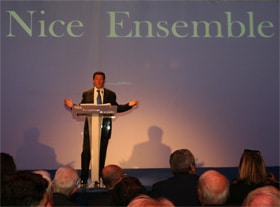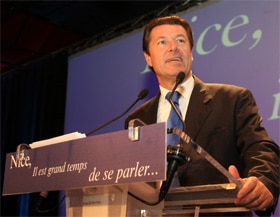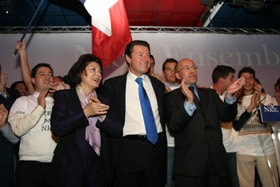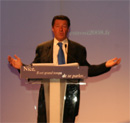 “Only the spoken word counts,” indicates the header of the speech that Christian Estrosi is about to deliver this Sunday evening in the large Acropolis hall. His press office is right to warn journalists as personal digressions and lyrical outbursts will be abundant. In response to a pre-conquered audience that welcomes him with a “standing ovation,” he crosses the room to slightly martial music, generously distributing smiles and handshakes before giving a lengthy speech of over 50 minutes. In a sometimes tearful tone and with a voice of surprisingly painful accents, he recites like an endless curriculum vitae his solid Niçoise references through a gallery of local emblematic figures. He also emphasizes his transgenerational origins, even evoking “his carnal ties,” even “blood relations” with the city. Along the way, he fully embraces his sporting heritage, which sometimes earned him a few jibes in Parisian salons but of which he proudly claims before this assembly: that of having “worn the colors of Nice on his motorcycle” and “made the Marseillaise resonate” thanks to it on podiums around the world.
“Only the spoken word counts,” indicates the header of the speech that Christian Estrosi is about to deliver this Sunday evening in the large Acropolis hall. His press office is right to warn journalists as personal digressions and lyrical outbursts will be abundant. In response to a pre-conquered audience that welcomes him with a “standing ovation,” he crosses the room to slightly martial music, generously distributing smiles and handshakes before giving a lengthy speech of over 50 minutes. In a sometimes tearful tone and with a voice of surprisingly painful accents, he recites like an endless curriculum vitae his solid Niçoise references through a gallery of local emblematic figures. He also emphasizes his transgenerational origins, even evoking “his carnal ties,” even “blood relations” with the city. Along the way, he fully embraces his sporting heritage, which sometimes earned him a few jibes in Parisian salons but of which he proudly claims before this assembly: that of having “worn the colors of Nice on his motorcycle” and “made the Marseillaise resonate” thanks to it on podiums around the world.
The rest of the speech proves more classical and conforms to the norms of political strategy: with more or less subtlety, Christian Estrosi exploits each paragraph of his intervention by directing it to a specific professional corporation, an identified social category, or a targeted religious or ethnic group. This traditional “fishing for votes” can surprise when the President of the General Council is widely favored by mysterious polls circulating in the city.
 The much-awaited moment soon arrives. After extensively “listing” the professional or friendly support he has, whether in the scientific, medical, literary, or academic field, occasionally stoking the narcissism of minor differences by criticizing Marseille’s competition to the detriment of “our city,” his speech takes a change of tone: resolutely positioning himself as the candidate of “hope” and “rupture,” he delivers a profoundly liberating “yes” for himself and the room that begins to applaud wildly.
The much-awaited moment soon arrives. After extensively “listing” the professional or friendly support he has, whether in the scientific, medical, literary, or academic field, occasionally stoking the narcissism of minor differences by criticizing Marseille’s competition to the detriment of “our city,” his speech takes a change of tone: resolutely positioning himself as the candidate of “hope” and “rupture,” he delivers a profoundly liberating “yes” for himself and the room that begins to applaud wildly.
Then comes the political program whose philosophy of openness constitutes a local replica of that claimed nationally by the President of the Republic, and so often criticized within the ranks of the UMP itself. Like Nicolas Sarkozy did in the capital, his faithful political ally intends to offer the opposition “representation in the Agglomeration Community,” or even to entrust the latter with “the Presidency of municipal commissions.” Not without a certain contradiction for a candidate who claims that his “only label will be that of Nice” and not “that of a party” to which he belongs, Christian Estrosi seems to want to apply once again the national recipes that brought the UMP good fortune among the French. “Three major thematic conventions” will thus be organized over the next two months to prepare “his project.” Like those organized on rue de la Boétie, they will focus on “proximity,” “attractiveness,” “health and environment.”
Finally, and to put an end to this bad image of Nice, which has “suffered too long from cases involving elected officials or municipal employees,” Christian Estrosi somehow defends the rather innovative idea – not without risks in the regional context – of a “mani pulite” operation, Nice-style: it will involve giving the Presidency of the City’s Bids Review Committee to the opposition while appointing a Magistrate to the position of Inspector General of City Services, in charge of checking and ensuring the regularity of all public procurement procedures.
 Christian Estrosi may assure that he will not launch any personal attacks during this campaign, but he knows he is treading safe ground when addressing the current issues that irk the Niçois: “how,” he exclaims, “can you run a tram if there’s no parking or if they’re overpriced?” The audience literally exults, just as it will loudly show its enthusiasm at the repeated mentions of Jacques Médecin, whom the declared candidate spiritually aligns himself with. To top it all off, Nice would regain its international vocation “to make the world dream” by hosting the headquarters of this “Mediterranean Union,” a project launched by Nicolas Sarkozy upon his ascension to the presidency. In the meantime, and more modestly, Nice is expected to host the next Franco-Italian summit.
Christian Estrosi may assure that he will not launch any personal attacks during this campaign, but he knows he is treading safe ground when addressing the current issues that irk the Niçois: “how,” he exclaims, “can you run a tram if there’s no parking or if they’re overpriced?” The audience literally exults, just as it will loudly show its enthusiasm at the repeated mentions of Jacques Médecin, whom the declared candidate spiritually aligns himself with. To top it all off, Nice would regain its international vocation “to make the world dream” by hosting the headquarters of this “Mediterranean Union,” a project launched by Nicolas Sarkozy upon his ascension to the presidency. In the meantime, and more modestly, Nice is expected to host the next Franco-Italian summit.
At the end of his performance, tongues loosen. Enthusiastic and convinced individuals compete with compliments, a sign of real satisfaction and a tone in line with the expectations of the attendees. Others lament the lack of originality, even humor, which would have introduced, in their view, a “real difference from the psychorigidity of the current Mayor of Nice.” Some “former close associates” of Jacques Peyrat sprinkle a few remarks here and there: “from the moment,” they explain, “Estrosi does not claim the UMP label, the issue of endorsement will arise differently.” The current “Senator-Mayor,” another interlocutor confides, “is overwhelmed with advice not to run again and to leave with his head held high.” Some also wonder about the possible “directions” – left or right – that the “openness” announced by the candidate will take. Christian Estrosi can therefore savor this first victory: that of having, like his Parisian political mentor, succeeded in shattering the Niçois political magma.
Photos: Didier Quillon
mail: dqd@hotmail.fr


